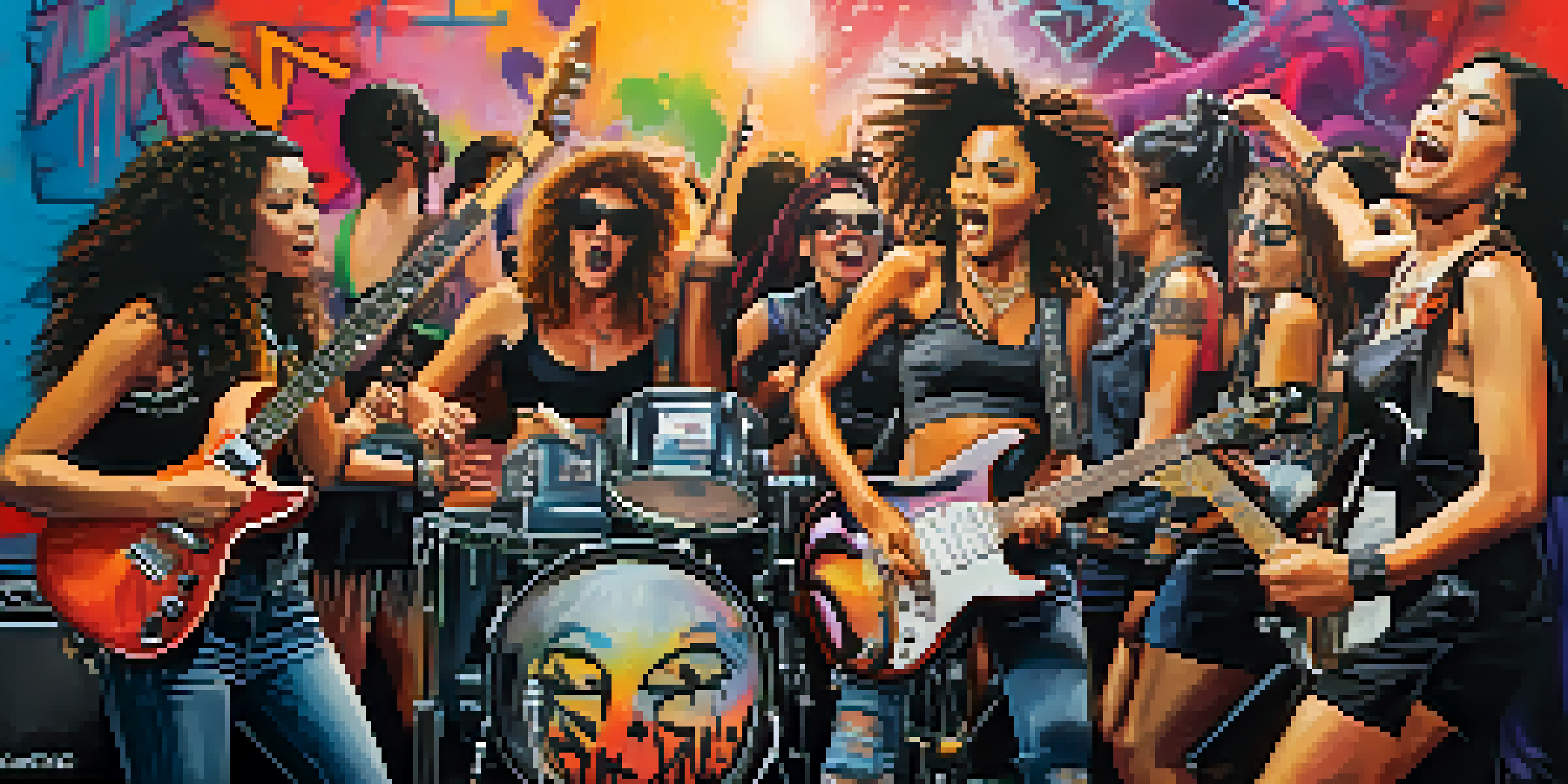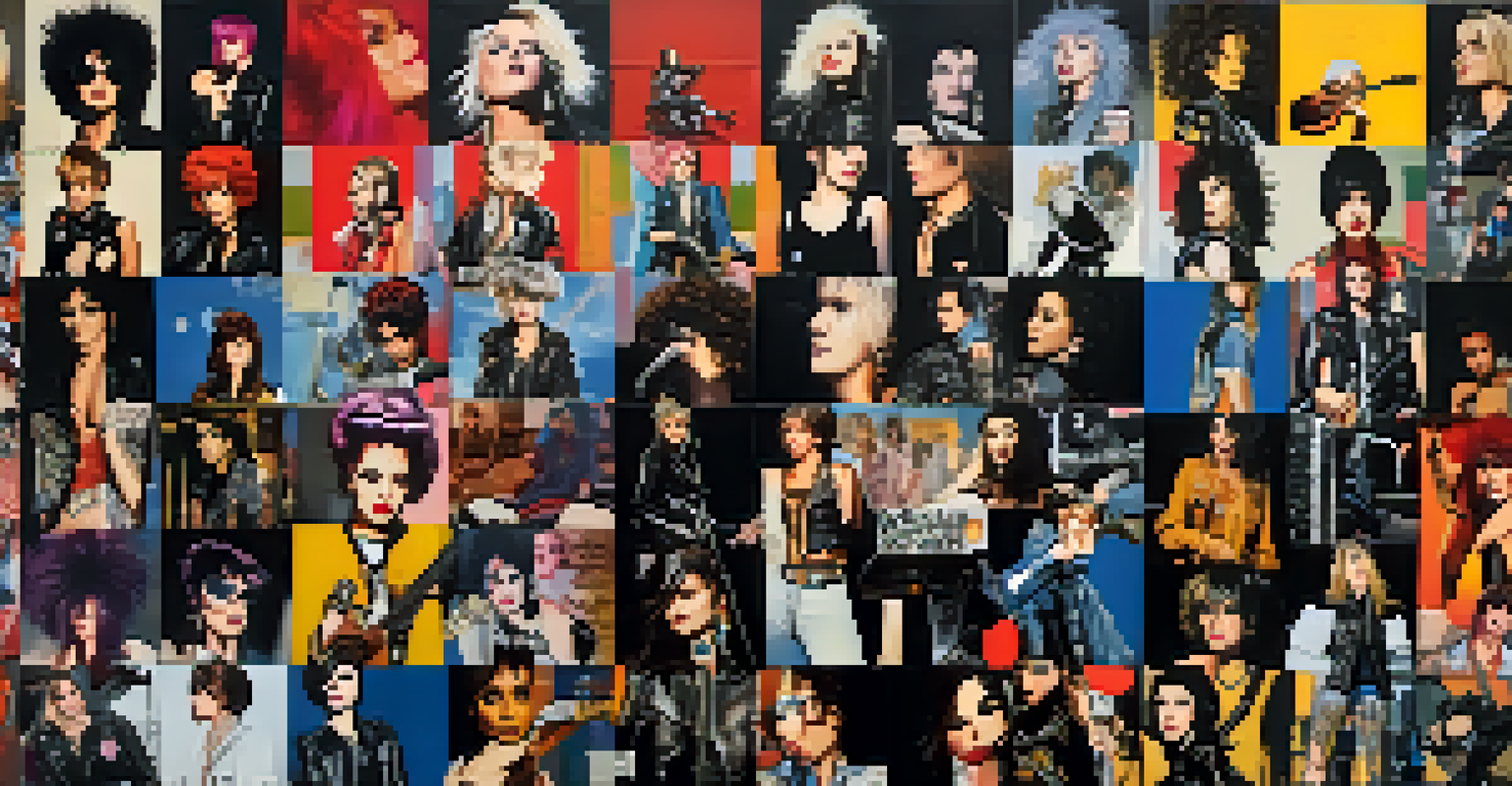Women in Punk: A Historical Overview of Their Influence

The Birth of Punk: A Scene Where Women Roared
In the mid-1970s, the punk movement emerged as a vibrant counterculture challenging societal norms. Women played a crucial role in shaping this scene, breaking through the male-dominated landscape. Icons like Debbie Harry of Blondie and Poly Styrene of X-Ray Spex showcased a bold, unapologetic attitude that redefined femininity in rock music.
Punk is about being yourself and doing what you want to do, not following what someone else thinks you should be.
These women not only contributed their talent but also their unique perspectives, bringing issues like gender equality and identity to the forefront. Their presence encouraged more female musicians to take the stage, creating a ripple effect that would influence generations. The punk ethos of rebellion became a powerful platform for women to express their individuality and fight against stereotypes.
As punk evolved, the contributions of women were often overlooked, but their influence was undeniable. They infused punk with a sense of urgency and authenticity that resonated with audiences. The rebellious spirit of these women set the tone for what punk would become, proving that their voices were vital in this transformative era.
Pioneers of Punk: Women Who Shook the Foundations
Women like Joan Jett and Siouxsie Sioux were not just participants; they were pioneers who shaped the punk sound and style. Joan Jett’s raw energy and catchy riffs with The Runaways and her later success as a solo artist broke barriers, proving that women could rock hard. Siouxsie Sioux, with her flamboyant fashion and powerful vocals, led the charge in the post-punk movement, inspiring countless artists.

These trailblazers demonstrated that punk was not just a boys' club; it was a space for everyone to express their creativity and defy conventions. Their fearless attitudes and artistic innovations encouraged other women to embrace their identities and challenge the status quo. The diversity of their contributions broadened the punk narrative, showing that it was a movement driven by different voices and experiences.
Women Shaped Punk's Identity
Female artists like Debbie Harry and Joan Jett broke barriers, redefining femininity and establishing essential roles in the punk movement.
The legacies of these women continue to resonate today, reminding us that the spirit of punk is rooted in rebellion against oppression. Their influence can be seen in modern music, where female artists draw inspiration from their punk predecessors. By breaking barriers, they paved the way for future generations to explore their creativity fearlessly.
The Riot Grrrl Movement: Feminism Meets Punk
The early 1990s saw the rise of the Riot Grrrl movement, a fierce, feminist punk subculture that called for female empowerment and social change. Bands like Bikini Kill and Bratmobile used their music as a platform to address issues such as sexual assault, body image, and sexism in the music industry. This movement was more than just music; it was a cultural revolution that encouraged women to speak out.
The personal is political; that was the motto of the Riot Grrrl movement, and it still resonates today.
Riot Grrrls embraced DIY ethics, creating zines, organizing protests, and promoting female artists. They fostered a sense of community that challenged the patriarchal norms of not only punk but society as a whole. This grassroots approach allowed women to reclaim their narratives and assert their identities, making the punk scene more inclusive.
The impact of Riot Grrrl continues to be felt today, inspiring new generations of feminist artists and activists. This movement demonstrated that punk could be a powerful vehicle for social change, where music and ideology intertwined. The legacy of these women reminds us of the importance of solidarity and the ongoing fight for equality.
Intersectionality in Punk: Diverse Voices Matter
As punk evolved, so did the understanding of diversity within the movement. Women of color, LGBTQ+ individuals, and those from various backgrounds brought their unique experiences to punk, enriching its narrative. This intersectionality highlighted that the fight for representation was essential in creating a truly inclusive scene.
Artists like Tina Weymouth of Talking Heads and Yvette Inoue of the group Kishi Bashi brought different cultural influences and perspectives to the punk genre. Their contributions demonstrated that punk was not monolithic; it could incorporate various identities, making it more relatable to a broader audience. This shift encouraged conversations about race, sexuality, and gender within the punk community.
Riot Grrrls Sparked Feminist Change
The Riot Grrrl movement of the 1990s empowered women to address social issues and created a community that challenged patriarchal norms.
By embracing intersectionality, punk opened its doors to a wider array of voices, making it a richer and more dynamic genre. The importance of recognizing diverse perspectives continues to shape contemporary punk, as new artists emerge with stories that challenge traditional narratives. The evolution of punk reflects our society's ongoing journey toward inclusivity and understanding.
Challenging Stereotypes: Women as Leaders in Punk
Women in punk have consistently challenged stereotypes about female musicians. No longer relegated to the background, they have taken on leadership roles, both on and off the stage. From managing bands to producing albums, women have demonstrated that their contributions extend far beyond performance.
Artists like Kim Deal of The Breeders and Brody Dalle of The Distillers have not only fronted their bands but have also influenced the sound and direction of their music. Their roles as songwriters and producers underscore the importance of women's creativity in shaping the punk landscape. This shift has encouraged a new generation of female musicians to take charge and assert their voices.
The growing visibility of women in leadership positions within punk serves as a powerful reminder that gender equality is essential in all aspects of the music industry. Their presence inspires others to break down barriers and pursue their passions fearlessly. As the punk scene continues to evolve, the impact of these trailblazers will be felt for years to come.
Modern Punk: Continuing the Legacy of Women
Today, the legacy of women in punk is more vibrant than ever. Artists like Hayley Williams of Paramore and Mitski are redefining what it means to be a punk musician, blending genres while staying true to the rebellious spirit of punk. Their music tackles personal and societal issues, echoing the themes that early female punk artists championed.
These modern artists draw inspiration from their predecessors, ensuring that the voices of women in punk are heard loud and clear. Collaborations among female musicians are becoming more common, creating a sense of community and support within the industry. This camaraderie helps to combat the challenges women face, fostering an environment where creativity can flourish.
Modern Punk Champions Diversity
Today's punk scene continues to evolve, incorporating diverse voices and experiences, ensuring that the legacy of women remains vibrant.
As new punk bands emerge, they carry the torch lit by the women who came before them. The commitment to authenticity, empowerment, and social change remains at the core of punk's ethos. By honoring the contributions of women throughout punk history, the movement can continue to evolve while staying true to its roots.
The Future of Women in Punk: A Call to Action
As we look to the future, it's essential to continue supporting and uplifting women in the punk scene. The music industry must recognize the valuable contributions of female artists and create spaces where their voices can thrive. Encouraging mentorship, collaboration, and representation will ensure that the legacy of women in punk endures for generations to come.
Fans and industry professionals alike can advocate for more female-led initiatives, from music festivals to record labels. By amplifying women's voices and stories, we can challenge the status quo and promote a more inclusive punk culture. This call to action is not just about music; it's about fostering a community that celebrates diversity and empowerment.

The future of women in punk is bright, but it requires collective effort to maintain momentum. As we champion the next generation of female punk artists, we honor those who paved the way. Together, we can ensure that the punk movement remains a powerful force for change and a platform for all voices to be heard.